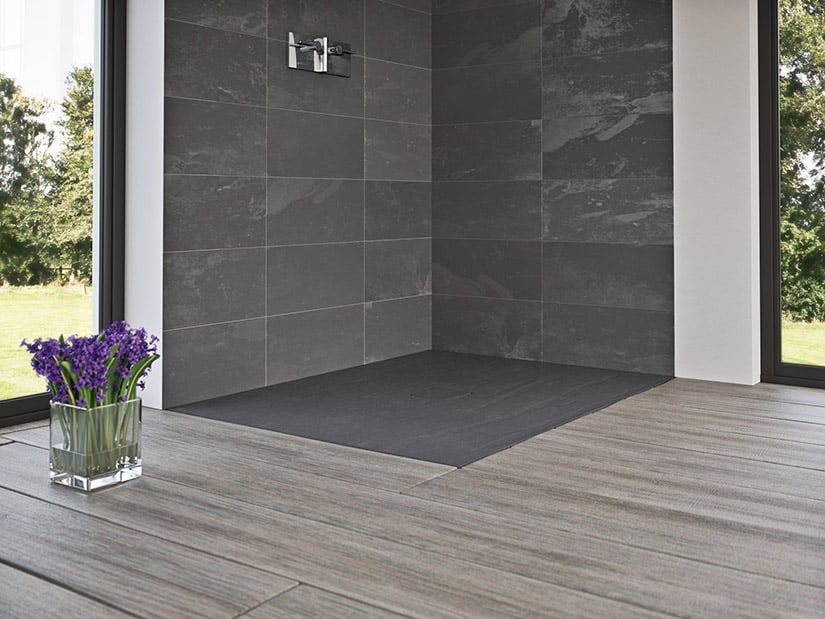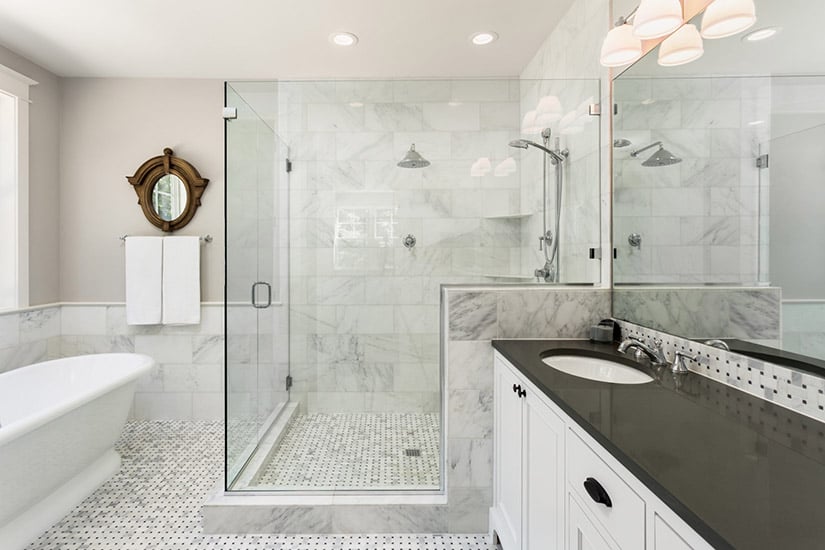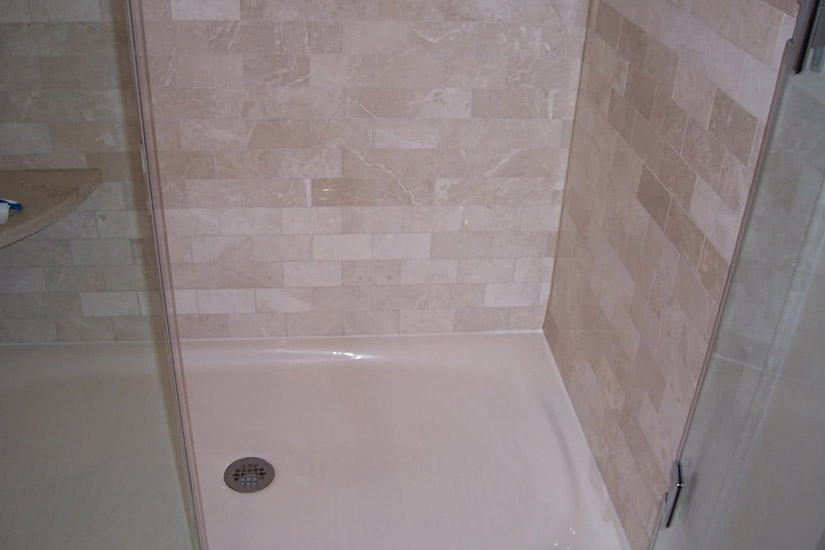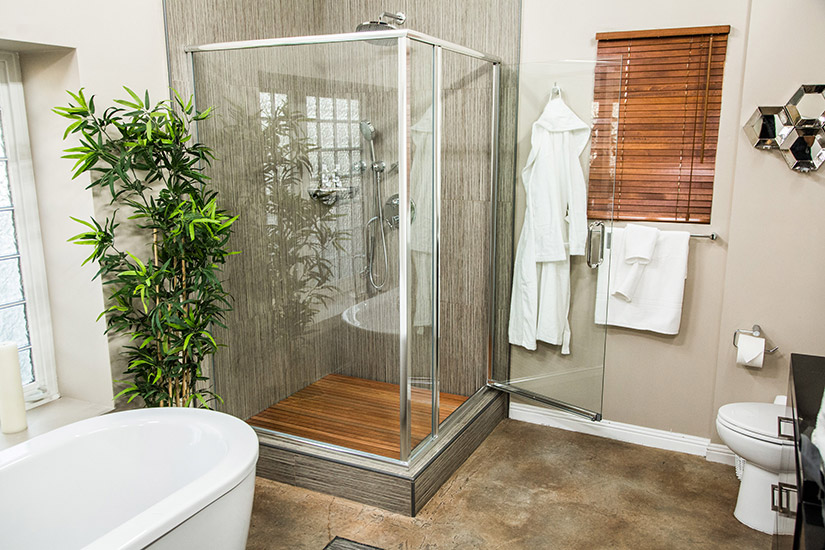flooring
Which Material is Best for Your New Shower Floor?
When planning a bathroom remodel, one of the first things on your to-do list is dealing with the shower. That means that you need to find the perfect option to replace your grimy, stained shower floor and bring the look of the entire room together.
Personal preference goes a long way in choosing a new shower floor, but whether you pick a timeless classic or an on-trend flooring material, knowing the pros and cons can help you decide that’s best for your home’s needs.
Natural Stone

Water and natural stone are the perfect complement, so what better place to put it than in your shower?
There are several options out there for natural stone materials, including pebbles that deliver texture and style. A few of the most popular types of stone used in shower floors include:
Marble
Luxury and marble are synonymous in a bathroom space, with white marble being the most popular option in showers. The versatile tile sizes and natural beauty of marble are its biggest advantages, but it is also prone to scratches, stains, or even rusting if you don’t properly seal a lower-grade marble that has a high iron content.
Granite
Granite is a highly durable, beautiful natural stone that is ideal for modern showers for several reasons. Available in an incredible array of colors, patterns, and veining options, it can suit any home aesthetic. It also resists chemicals found in common cleaning and hygiene products! Like with any natural stone, proper sealing is still a must to keep a granite shower floor looking its best.
Slate
As the most common form of stone used in showers, slate features a dark, smoky appearance that can give your bathroom drama and contrast. When sealed correctly, it is extremely durable and easy to keep clean, but you could run into problems with chips and flakes occurring over time.
Tile Flooring

Ceramic and porcelain tile have been the standard in bathrooms of all sizes and styles, and the main difference between them comes down to their water-resistant capabilities. Ceramic tile absorbs more than 0.5% water, while porcelain tile absorbs less than 0.5%. In a humid, small bathroom, porcelain is generally the smarter choice.
- Ceramic: Ceramic tile is a good compromise for homeowners that are on a tight budget with their bathroom remodel. Typically, this tile costs less than $4 per sq. ft., and it offers well-rounded advantages that make it an overall durable, easy-to-install option.
- Porcelain: When it comes to tile, you can’t get more versatile than porcelain! Scratch- and chemical-resistant, while being impressively waterproof, using this tile for your shower will give you flooring that lasts for decades. The drawbacks? You’ll still need to care for grout, and this tile is on the higher end of the price range.
Synthetic Materials

If a custom, luxury shower isn’t your goal?but cleanliness and versatility are?synthetic materials can give you a budget-friendly floor update with a number of benefits. You can find pre-fabricated shower bases in both fiberglass and acrylic construction, which makes them easy to install and maintain?while also giving you a grout-free finish.
Drawbacks to using synthetic material for your shower floor include:
- Limited Options for Customized Designs, Sizes, and Shapes
- Complete Replacement Needed if a Leak Occurs in the Floor
- Fading, Yellowing, and Cracking are Common Problems
When choosing between acrylic and fiberglass, acrylic floors have an edge on the competition. Acrylic shower bases are coated to resist common problems with discoloration and grime-buildup, and they retain more heat than fiberglass models.
Other Flooring Options

Tile, stone, and acrylic may be what you’ll see most in a home shower floor, but those aren’t the only options available! For those looking for a specific look or a unique bathroom design, consider:
- Wood: Wood floors and showers might not seem like they go together, but this natural material could be the ideal choice for bringing a spa-like ambiance to your space. Choose wood slat flooring in tropical wood species?or cedar, redwood, or mahogany?for best results.
- Concrete: Concrete has become a popular flooring choice in homes across the country, including in showers! While the look and durability of concrete makes it an on-trend choice, it does require regularly resealing and maintenance so avoid water damage.
- Glass: For a contemporary home, glass flooring is a stunning, low-maintenance option available in a wide array of colors?but it does have its disadvantages. These floors are notorious for being slippery, and their high price tag can put them out of reach for some homeowners.
- Cast Iron: You can’t get greater durability than with a cast iron floor! However, cast iron shower bases are enameled in porcelain, while does require some special care, and they are known for being cold on the feet.
You need to take into consideration the size, style, and specific needs of your bathroom when choosing a shower floor?after all, there’s no one-size-fits-all option for a bath design! Whether you go with the beauty of natural materials or a sleek, contemporary look, the right floor can take your new shower to the next level of comfort and style.
![See your dream kitchen in 3D [GET YOUR FREE DESIGN]](https://cdn.kitchencabinetkings.com/blog/wp-content/uploads/see-your-dream-kitchen-in-3d.webp)
![Contractor Discount Program: Offering contractors and builders special volume discounts on all applicable orders [LEARN MORE]](https://cdn.kitchencabinetkings.com/blog/wp-content/uploads/contractor-discount-program.webp)
![Explore our photo gallery [GET INSPIRED]](https://cdn.kitchencabinetkings.com/blog/wp-content/uploads/explore-our-photo-gallery.webp)
![What everyone is saying about KCK [READ REVIEWS]](https://cdn.kitchencabinetkings.com/blog/wp-content/uploads/what-everyone-is-saying-about-kck.webp)
![Get a cabinet sample [SHOP SAMPLES]](https://cdn.kitchencabinetkings.com/blog/wp-content/uploads/get-a-cabinet-sample.webp)
![Pay over time, on your terms with Affirm [LEARN MORE]](https://cdn.kitchencabinetkings.com/blog/wp-content/uploads/pay-over-time-on-your-terms-with-affirm.webp)